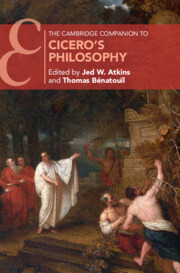Book contents
- The Cambridge Companion to Cicero’s Philosophy
- Series page
- The Cambridge Companion to Cicero’s Philosophy
- Copyright page
- Dedication
- Contents
- Contributors
- Preface
- Cicero’s Philosophical Works
- A Note on Abbreviations
- Introduction
- Chapter 1 Cicero’s Philosophical Writing in Its Intellectual Context
- Chapter 2 The Ciceronian Dialogue
- Chapter 3 Philosophy in Cicero’s Letters
- Chapter 4 Philosophy in Cicero’s Speeches
- Chapter 5 Cicero and the Creation of a Latin Philosophical Vocabulary
- Chapter 6 Cicero and Plato
- Chapter 7 Cicero’s Academic Skepticism
- Chapter 8 Cosmology, Theology, and Religion
- Chapter 9 Determinism, Fate, and Responsibility
- Chapter 10 Cicero on the Emotions and the Soul
- Chapter 11 Ethical Theory and the Good Life
- Chapter 12 Nature and Social Ethics
- Chapter 13 Philosophy, Rhetoric, and Politics
- Chapter 14 Cicero’s Republicanism
- Chapter 15 Empire, Just Wars, and Cosmopolitanism
- Chapter 16 Cicero and Augustine
- Chapter 17 Cicero and Eighteenth-Century Political Thought
- Chapter 18 Cicero and Twenty-First-Century Political Philosophy
- Bibliography
- Index of Cicero’s Texts
- General Index
- Series page
Chapter 5 - Cicero and the Creation of a Latin Philosophical Vocabulary
Published online by Cambridge University Press: 08 December 2021
- The Cambridge Companion to Cicero’s Philosophy
- Series page
- The Cambridge Companion to Cicero’s Philosophy
- Copyright page
- Dedication
- Contents
- Contributors
- Preface
- Cicero’s Philosophical Works
- A Note on Abbreviations
- Introduction
- Chapter 1 Cicero’s Philosophical Writing in Its Intellectual Context
- Chapter 2 The Ciceronian Dialogue
- Chapter 3 Philosophy in Cicero’s Letters
- Chapter 4 Philosophy in Cicero’s Speeches
- Chapter 5 Cicero and the Creation of a Latin Philosophical Vocabulary
- Chapter 6 Cicero and Plato
- Chapter 7 Cicero’s Academic Skepticism
- Chapter 8 Cosmology, Theology, and Religion
- Chapter 9 Determinism, Fate, and Responsibility
- Chapter 10 Cicero on the Emotions and the Soul
- Chapter 11 Ethical Theory and the Good Life
- Chapter 12 Nature and Social Ethics
- Chapter 13 Philosophy, Rhetoric, and Politics
- Chapter 14 Cicero’s Republicanism
- Chapter 15 Empire, Just Wars, and Cosmopolitanism
- Chapter 16 Cicero and Augustine
- Chapter 17 Cicero and Eighteenth-Century Political Thought
- Chapter 18 Cicero and Twenty-First-Century Political Philosophy
- Bibliography
- Index of Cicero’s Texts
- General Index
- Series page
Summary
Many of Cicero’s translations of Greek concepts (assent, comprehension, quality) have become common terms in philosophy but also in ordinary language in many European countries. Some of them, pertaining to epistemology, ethics, or physics, are studied in this chapter to show why and how Cicero set out to create a Latin philosophical vocabulary. He wanted to extend the supremacy of Rome to an area formerly reserved to the Greeks. He tried to avoid technical terms or neologisms and preferred open notions to closed concepts. He aimed at conveying the complexity of Greek philosophical doctrines in Latin and sometimes brought out certain nuances which did not exist in the Greek terms (as in the case of probabile). Cicero’s originality as a philosopher does not lie in creating a new system but in providing philosophy with a new language and in promoting the idea that philosophy was not the privilege of Greek culture but a field open to human ingenuity.
- Type
- Chapter
- Information
- The Cambridge Companion to Cicero's Philosophy , pp. 71 - 87Publisher: Cambridge University PressPrint publication year: 2021
- 3
- Cited by

